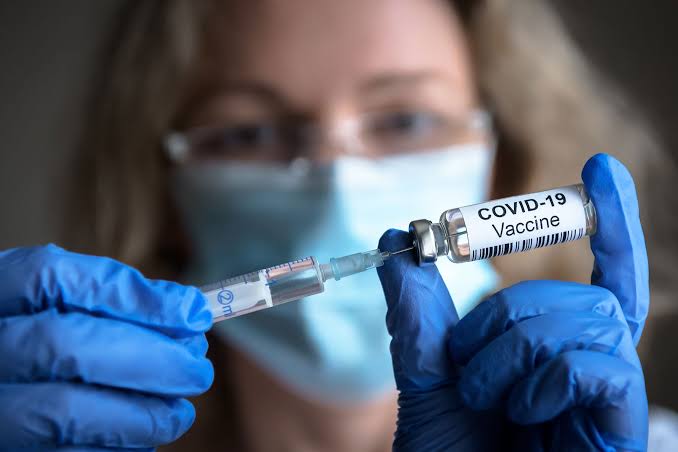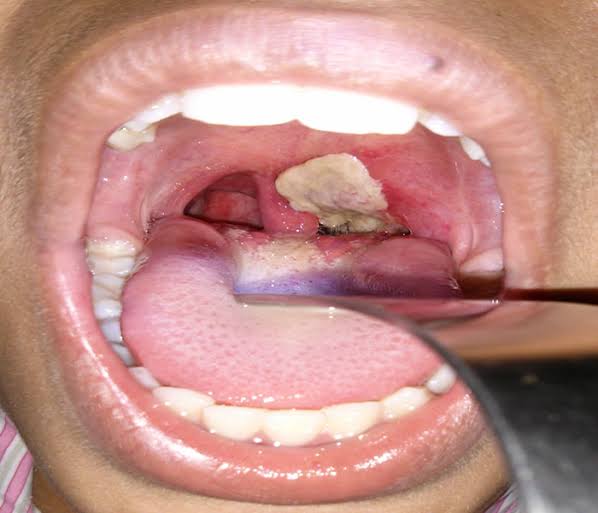Health
Health Officials Reveals How COVID 19 Vaccines Causes Heart Issues!

Pfizer and Moderna have been ordered by the Food and Drug Administration to add warning labels to their mRNA COVID-19 vaccines (Comirnaty and Spikevax)
to emphasize a rare risk of myocarditis and pericarditis,
which are conditions characterized by inflammation of the heart, mainly in males aged 16 to 25.
Previously, the labels addressed ages 12–17 (Pfizer) and 18–24 (Moderna);
now, they mention an incidence rate of 38 cases per million doses in this group.

Also Read:
NAFDAC Clarifies Fee For Reopening Shops In Ontisha Market
Diphtheria Breaks Out In Edo State, K!lls 2
Real Madrid Forward, Kylian Mbappe Hospitalized!
At almost 8 cases per million doses, the overall risk is still low for all recipients under 65.
This action comes after the FDA examined vaccine safety data from 2023–2024,
including insurance claims and a study that revealed some patients had persistent cardiac MRI abnormalities five months after diagnosis.
However, according to the CDC, these cases are uncommon, usually go away quickly,
and are not as severe as those brought on by the COVID-19 virus itself.
The FDA’s ruling also runs counter to earlier CDC evaluations that showed no elevated risk of myocarditis in vaccine injury databases since 2022.
FDA and CDC Clashes Over COVID-19 Vaccine Side Effects!
It also supports larger initiatives to strengthen vaccine oversight by the administration of Health Secretary Robert F. Kennedy Jr.
Kennedy recently appointed anti-vaccine advocates to all 17 CDC advisory panel positions, and FDA Commissioner Marty Makary,
who opposes COVID-19 booster mandates, has limited yearly vaccinations to high-risk populations (such as senior citizens).
Critics however argue that the label expansion overlooks context: Studies confirm COVID-19 infection poses a 16-fold higher myocarditis risk than vaccination,
and most post-vaccine cases are mild, resolving with anti-inflammatory treatment.
Yale researchers also note the inflammation is transient, not autoimmune, allowing full recovery.
Meanwhile, Medical experts condemn the FDA’s approach as misleading.
“They are right to suggest that we need to consider myocarditis risks associated with the vaccine, but what they propose is exactly the wrong solution,” said Dr. Robert Morris of the University of Washington.
“We should be investigating who is prone to myocarditis to see if we can predict and mitigate that risk,” according to a report by AP.

Featured
Mary Remmy Njoku Raises Alarm Over High Rate Of Fake Drugs In Nigeria

After suffering food poisoning on a movie set, Nollywood actress and producer Mary Remmy Njoku has voiced doubts about the effectiveness of drugs in Nigeria.
In a Tuesday Instagram post, the actress expressed concern about the potential spread of counterfeit drugs after taking Imodium, a prescription that reduces the incidence of diarrhoea.
According to the mother of three, she took the tablet which was purchased from one of the biggest pharmacy chains in Nigeria but the symptoms still persisted after three days.
However, when her husband gave her a tiny tablet of the same Imodium he bought abroad, she felt better within five minutes.
She called on the National Agency for Food and Drug Administration and Control (NAFDAC) to urgently look into the matter.
Also Read:
OAP Lolo1 Goes Public With New Lover
Purp Emerges As Nigerian Idol Season 10 Winner
Nigerian Celebrities Reacts To Former President Buhari’s Demise
“Let me share a recent experience: I had a bit of food poisoning on a set. Sent a staff to buy Imodium from the arguably one of the biggest pharmacy chains in Nigeria. A medication I’ve used many times before. I took it for three days straight, and nothing changed. The symptoms didn’t stop,” she wrote.
“Then my husband returned from a trip and gave me a tiny tablet of the same Imodium. this time from abroad. I took it, and within five minutes, my stomach calmed down. Just five minutes!”
“This isn’t my first time noticing this kind of difference. So I have to ask: What exactly are we being sold in Nigeria? What’s going on with our drugs? This is a public health risk and NAFDAC must take it seriously. This is dangerous.”

Netizens Blame The East Over Increase In Fake Drugs!
Meanwhile some netizens have blamed the east for the continuous rise in peddling of fake drugs
Some of the comment reads:
“When the same nafdac sealed fake pharmaceutical stores in the east, ur brothers and sisters call it witch hunting”
“We all know those behind the fake drugs industry and we should stand by nafdaq when they took action. No one is witch hunting anybody”
“Mary Njoku,, the answer to your question is not far fetched. Please appeal on behalf of all Nigerians to your evil minded brothers, who are non pharmacists, nor licenced pharmaceutical products manufacturers and importers tó STOP killing Nigerians through importation and manufacturing of fake drugs. Despite all the seizures at the ports and raids on their warehouses in the East, they still are unrelenting in dealing in fake pharmaceuticals in their quest to be wealthy.”
Health
Shocking! Lizzo Admits to Trying Ozempic to Lose Weight

Famous American singer Lizzo has admitted that she tried Ozempic and other weight loss drugs after denying accusations that she used medications to shed weight.
She made the revelation during a conversation about Ozempic on Thursday’s episode of Trisha Paytas’ “Just Trish”.
In the podcast, Lizzo admitted that she tried using medications to lose weight.
“It’s not easy,” Lizzo confessed.
The singer, whose real name is Melissa Viviane Jefferson, said she “tried everything” to lose weight. However, she said she ended up focusing on counting calories instead of taking the weekly jab.
“It’s just the science for me, calories in versus calories out,” Lizzo added.
“Ozempic works because you eat less food. That’s it. It makes you feel full, so if you can just do that on your own and get mind over matter, it’s the same s**t.”
Paytas questioned how the 37-year-old managed to control her food intake without a shot.

The singer credited changing her workout routine and shared that she was no longer vegan or eating plant-based, which she has done for “like 10 years.”
ALSO READ
Barbecue Seller Killed, Others Kidnapped at Oko Polytechnic Attack
Telegram CEO Says He Will Equally Share His Fortune With His 106 Children!
2027: Tinubu To Pick A Running Mate After APC Convention!
“When I was vegan, I was consuming a lot of fake meats, I was eating a lot of bread, I was eating a lot of rice, and I had to eat a lot of it to stay full, but really I was consuming like 3,000 – 5,000 calories a day,” she shared.
The “About Damn Time” songstress claimed she now eats whole foods such as beef, chicken and fish to feel full instead of “putting a lot of fake things in there that wasn’t actually filling me up.”
Lizzo added meat back into her diet during a trip to Japan.
“I heard the Japanese diet was the healthiest diet in the world,” she said. “My body was so happy. My body was like, ‘more, more please.’ And I was like, ‘ok, this is what my body likes.’
“I don’t like to tell people too much about releasing weight like what I did because I don’t want people to do what I did and it doesn’t work for them. Everybody’s body is different.”
Lizzo, who heavily promoted body positivity throughout her career, didn’t specify which GLP-1 brand she allegedly took or when she tried it.
Common GLP-1 drugs people use to drop weight include Wegovy, Mounjaro and Ozempic, which were initially developed to improve blood sugar in adults with type 2 diabetes.
Health
Diphtheria Breaks Out In Edo State, K!lls 2

The Edo State Government has confirmed a diphtheria outbreak in the state, with two deaths reported out of five confirmed cases.
At a Tuesday, June 3 emergency response meeting in Benin, Dr. Cyril Oshiomhole, the Edo State Commissioner for Health, revealed this.
Also Read:
NAFDAC Clarifies Fee For Reopening Shops In Ontisha Market
Lady Accuses BBNaija Khloe of Assault and Attempted Murder
John Brenkus, ESPN’s “Sports Science” Host Dies At 54!
The commissioner claims that after laboratory confirmation from the University of Benin Teaching Hospital (UBTH)
confirmed the outbreak, health authorities and partners were immediately mobilized to stop its spread.

This outbreak is a serious cause for concern,” Dr Oshiomhole said.
“Diphtheria is a highly contagious bacterial infection that affects the nose and throat, and if not treated promptly, it can lead to severe complications or de@th.”
Furthermore, the emergency meeting convened key stakeholders, including representatives from the World Health Organization (WHO),
UNICEF, local health institutions, and development partners to coordinate a swift and effective response.
Oshiomole also outlined a multi-pronged containment strategy, including the deployment of a rapid response team,
strengthened surveillance and contact tracing, enhanced public awareness, and improved vaccine accessibility across the state.
He further highlighted the compounding threats posed by antimicrobial resistance
and co-infections, underscoring the urgency of a coordinated public health effort.
“We are acting decisively to prevent further loss of life. Community engagement, early detection, and vaccination are crucial to stopping the spread,” he added.
Residents were urged to remain vigilant and report early symptoms such as sore throat, fever, or breathing difficulties to the nearest health facility.
People were also advised to avoid close contact with infected individuals and to observe good hygiene practices.
“This is not a time to panic, but to stay informed, stay calm, and act responsibly,” Dr Oshiomhole concluded.
WHAT IS DIPHTHERIA?
Diphtheria is a contagious infection caused by a bacterium called Corynebacterium diphtheriae. The bacterium releases a toxin that causes a buildup of grey tissue in your throat, leading to problems with swallowing and breathing.
You can catch diphtheria through airborne droplets that contain bacteria (spread by sneezing, coughing and spitting) or by touching something that has bacteria on it. It is also possible that an infected person could transmit the disease through an open sore touched by someone else, or touching clothes that someone else touches. It’s possible to get diphtheria more than once.
Diphtheria treatment begins immediately — sometimes even before the lab test results are confirmed. Your healthcare provider will prescribe diphtheria antitoxin to stop damage to your organs. They’ll also prescribe antibiotics, typically penicillin or erythromycin, to fight infection.
People with diphtheria are kept in isolation to prevent others from becoming infected. An infected person is no longer contagious around 48 hours after taking antibiotics.
Culled from: Cleveland Clinic
Health
“Stop Flavored Tobacco and Nicotine Products!”-WHO

The World Health Organisation (WHO) is calling on governments to urgently ban flavoured tobacco and nicotine products.
The global health body, in a statement at the weekend, said the products include cigarettes, pouches, hookahs, and e-cigarettes to protect youths from addiction and disease.
The organisation noted that flavours like menthol, bubble gum and cotton candy are masking the harshness of tobacco and nicotine products, turning toxic products into youth-friendly bait.
According to the statement, flavours not only make it harder to quit but have also been linked to serious lung diseases.
It also said that cigarettes, which still kill up to half of their users, come in flavours or can have flavors added to them.

The Director-General of WHO, Tedros Ghebreyesus, said that flavours were fueling a new wave of addiction and should be banned.
ALSO READ:
NAFDAC Clarifies Fee For Reopening Shops In Ontisha Market
DJ Cuppy Says God is Husband to Unmarried Women in Their 30s
Blessing CEO Finally Addresses Clash With Blogger, Tosin Silverdam
Ghebreyesus said this undermined decades of progress in tobacco control.
“Without bold action, the global tobacco epidemic, already killing around eight million people each year, will continue to be driven by addiction dressed up with appealing flavours,” he said.
According to him, the publication of flavour accessories in tobacco products enhances attractiveness and appeal, revealing how flavours and accessories like capsule filters and click-on drops are marketed to bypass regulations and hook new users.

He said that currently, more than 50 countries have banned flavoured tobacco. More than 40 countries have banned e-cigarette sales. Five specifically banned disposables and seven banned e-cigarette flavours; and flavour accessories remain largely unregulated.
READ MORE:
Teens and Dangers Of Vaping
Ice Prince Explains Why He Is Addicted to Smoking
DJ Cuppy Says God is Husband to Unmarried Women in Their 30s
The World Health Organisation said that countries such as Belgium, Denmark, and Lithuania are taking action. It urged others to follow.
“Flavours are a leading reason why young people try tobacco and nicotine products,” he said.
“Paired with flashy packaging and social media-driven marketing, they’ve increased the appeal of nicotine pouches, heated tobacco, and disposable vapes into addictive and harmful products, which aggressively target young people.”
WHO’s Director of Health Promotion, Rüdiger Krech, said that they are watching a generation get hooked on nicotine through gummy bear-flavoured pouches and rainbow-coloured vapes.
“This isn’t innovation, it’s manipulation. And we must stop it,” Krech said.
WHO reiterated that tobacco products, including heated tobacco products, expose users to cancer-causing chemicals and should be strictly regulated.
He said that the 2025 World No Tobacco Day campaign honored governments, youth activists and civil society leaders pushing back against industry interference.
“Your actions are changing policy and saving lives,” he said.
He said that with around eight million tobacco-related deaths each year, the time for action is now.
World No Tobacco Day is celebrated every 31 May.
The theme of 2025 is ‘Unmasking the Appeal: Exposing Industry Tactics on Tobacco and Nicotine Products.’
Health
NAFDAC Clarifies Fee For Reopening Shops In Ontisha Market

The National Agency for Food and Drug Administration and Control (NAFDAC) has finally broken its silence over the alleged extortion of traders in Onitsha market.
The controversy began when popular social media activist, Verydarkman, accused the agency of demanding N700,000 from shop owners whose stores were sealed during a recent raid.
Watch the video HERE
According to NAFDAC, two administrative charges were enforced against the traders.
The first charge was an investigative fee of N5 million for selling unregistered products, which was later reduced to N200,000 after the traders pleaded for leniency.
And the second charge was a N2 million fine for violating Good Storage and Distribution Practices, which was reduced to N500,000.

Verydarkman calls out Nafdac
NAFDAC’s statement seems to be a direct response to Verydarkman’s allegations, which went viral on social media.
Furthermore, the agency maintains that the charges were legitimate and in line with their regulatory framework.
However, the question remains: were the charges truly justified, or was there indeed extortion involved?
Also Read:
Speed Darlington Launches Giveaway For Fans Amidst Call For His Arrest
Korean Star Actor Choi Jung Woo is Dead
Speed Darlington; Nigerians Call For Arrest After Singer Admits To R*ping 15yr Old Girl
The NAFDAC Raid!
Recall that NAFDAC recently carried out a raid at the Onitsha Bridge Head Market in Anambra State,
targeting stores selling unregistered, banned, expired, substandard, and falsified medicines.
The agency’s actions were aimed at protecting public health and ensuring compliance with regulatory standards.
As the investigation continues, it remains to be seen whether NAFDAC’s explanation will satisfy the public and the traders involved.
One thing is certain, however: transparency and accountability are essential in regulatory agencies,
and any allegations of extortion must be taken seriously.
Meanwhile the outcome of this controversy will likely have implications for NAFDAC’s reputation and its relationship with the public.
Will the agency be able to restore trust and demonstrate its commitment to protecting public health without engaging in extortionate practices?
-

 Entertainment9 months ago
Entertainment9 months ago“I Made ₦10million In A Week During Covid”-Aisha Lawal
-

 Entertainment9 months ago
Entertainment9 months ago“I AM A PROUD YORUBA BOY!!!”-Mr Macaroni Slams APC Supporters
-

 Featured7 months ago
Featured7 months agoAir India Pilot Allegedly Crashed Plane Intentionally – Avaition Expert Claims
-

 Entertainment9 months ago
Entertainment9 months agoSeyi Law Slams Tunde Ednut for Alleged Harassment
-

 Featured9 months ago
Featured9 months agoResident Evil 9 Returns! See Official Release Date
-

 Entertainment9 months ago
Entertainment9 months agoAura For Aura: Iyano Ojo Drags Tanzania Media Personality, Mage Kimambi over Priscy And Jux’s Call Out!
-

 Entertainment9 months ago
Entertainment9 months agoOlamide And Asake Collaborates On New Track “99”: Feud Over?
-

 Entertainment8 months ago
Entertainment8 months ago“We Were Paid ₦10k Daily to Campaign For Tinubu”-Actor Lalude
